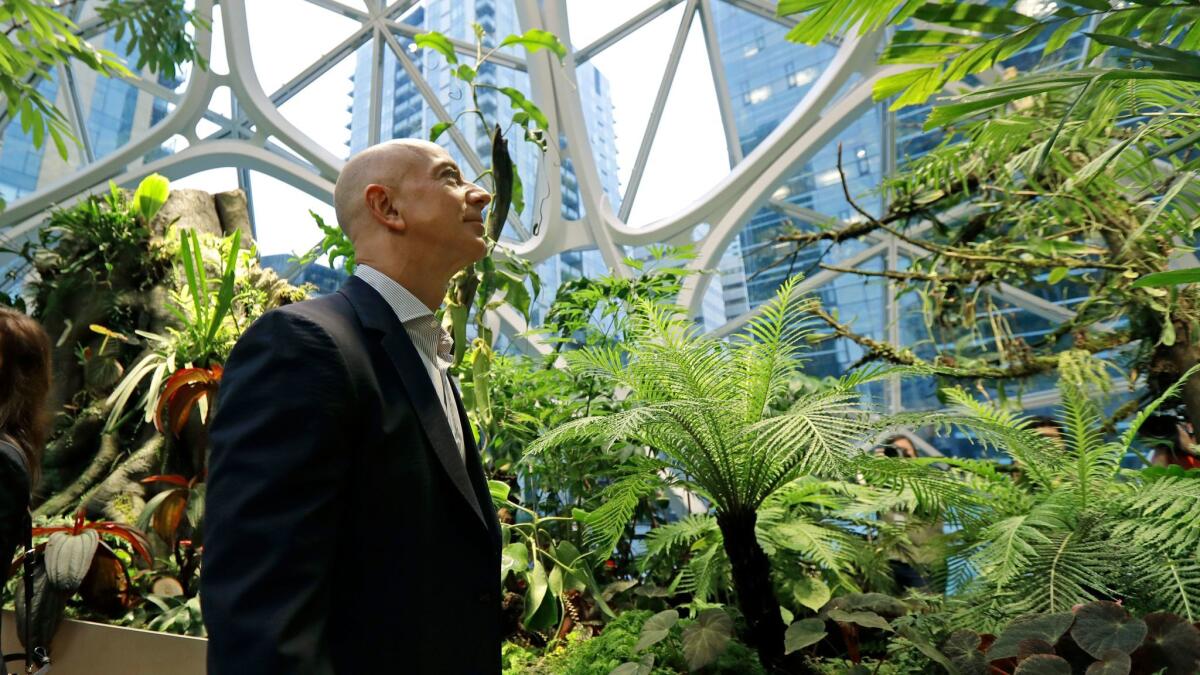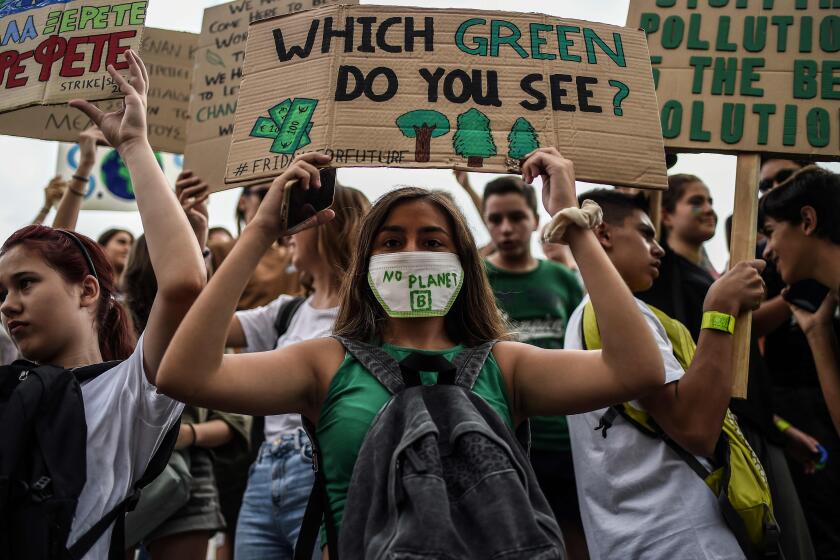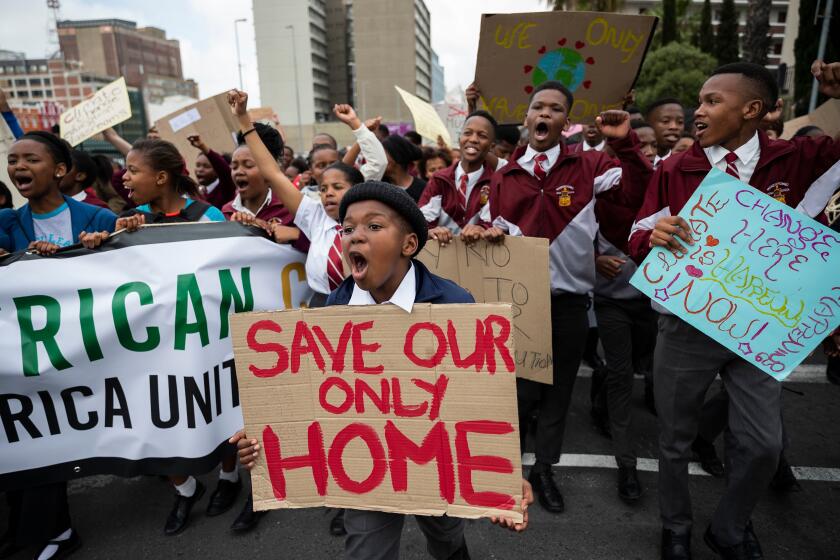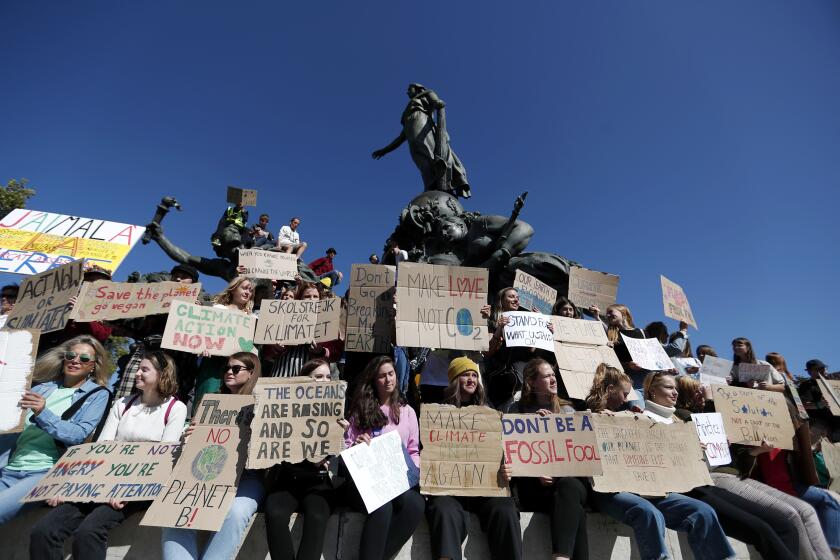Jeff Bezos expanded Amazon’s climate change pledge. His workers want more

Unlike some of its rival technology giants, Amazon.com Inc. has never claimed a loftier purpose than selling its shoppers what they want, quickly and cheaply. Its mission statement: to be “Earth’s most customer-centric company.”
As political storms have overtaken Facebook and Alphabet’s Google in the last few years, Amazon’s pursuit of commerce over utopian visions has mostly served it well, insulating it from charges of bias or hypocrisy and helping it remain one of Americans’ most trusted brands. But over the last year, a growing contingent of employees has been calling for the company to embrace the mantle of higher corporate responsibility and help combat the perils of climate change.
For the record:
6:58 p.m. Sept. 20, 2019A previous version of this article referred to the Carbon Disclosure Project as the Carbon Disclosure Product.
On Friday, hundreds of Amazon employees walked out of the firm’s Seattle headquarters, as did contingents from Amazon offices in Los Angeles, San Francisco, New York, Toronto, Dublin and other cities, as part of a global “climate strike” also including employees of other companies, students and youth groups. The effort was timed ahead of a United Nations Climate Action Summit to be held Monday in New York.
The group leading the Amazon walkout — Amazon Employees for Climate Justice — has spent this year urging Chief Executive Jeff Bezos and the rest of senior management to take more urgent steps, and the workers’ efforts are a key reason Amazon’s overall environmental footprint increasingly is coming under scrutiny.
Young people see climate change as a profound injustice and an existential threat. But they believe the world can still do something about it.
Their protests appeared to pay off Thursday when Bezos announced that Amazon would significantly step up its effort to reduce its dependence on fossil fuels to power its massive operations.
Under a new Climate Pledge, Amazon is committed to the goal of reaching net-zero carbon emissions by 2040, a decade earlier than called for under the United Nations Paris Agreement, Bezos said.
As part of that initiative, he said, Amazon will be using 100% renewable energy companywide by 2030, a goal the employees’ group has been seeking.
Amazon will order 100,000 electric-powered delivery trucks from the automaker Rivian as part of the effort, Bezos said. Amazon earlier had made a $440-million investment in Rivian.
“We’re done being in the middle of the herd on this issue — we’ve decided to use our size and scale to make a difference,” Bezos said in a statement, adding that Amazon is pushing for other companies to join the pledge.
The employees’ group responded on Twitter, saying that Amazon’s pledge was “a huge win” for the group and that “we’re thrilled at what the workers have achieved in under a year.”
“But we know it’s not enough,” the group said Thursday. “The Paris agreement, by itself, won’t get us to a livable world. Today, we celebrate. Tomorrow, we’ll be in the streets.”
On Friday, Maren Costa, an Amazon user experience designer, joined the walkout at company headquarters in Seattle and brought her three children. “Their generation is the one that is most impacted by the damage that our generation is doing,” she said. Costa, 50, said she has worked at Amazon for 15 years, helping to design the shopping website and launch Amazon Go stores.
“I was walking on air yesterday, I was so happy” about Bezos’ announcement, she said. “I’m so proud of Amazon for taking that big step forward. But it’s not enough.” She is among the employees who want the company to end its contracts with oil and gas companies.
The heightened focus on Amazon comes as Americans are increasingly concerned about the effects of climate change, according to a survey early this year by the Yale Program on Climate Change Communication.
On Friday, 5,000 youth-led demonstrations in 156 countries — 100-plus in California — will demand government action to end reliance on fossil fuels.
Amazon’s slowness in switching to renewable energy has been one focus of its climate critics. They’ve also assailed the company, with sales of nearly $233 billion last year, for selling its computer services to the oil and natural gas industry, for shifting more toward plastic mailers for deliveries that are not easy to recycle, and for donating to the campaigns of congressional representatives who have voted against climate legislation.
“They need to do more and be more urgent,” said Danilo Quilaton, an Amazon product designer in San Francisco and one of the employee group’s organizers.
“Amazon employees are deeply concerned about the climate crisis, and we see how it’s impacting our lives,” Quilaton said. “They’re not moving fast enough.”
U.S. workers, especially in the technology industry, increasingly have been pushing for corporate activism on social and environmental matters.
At Alphabet Inc.’s Google unit, employees have protested the firm’s development of a search engine for China, its work on artificial intelligence for missile drones and its handling of sexual misconduct claims. In February, a group of Microsoft Corp. employees calling itself Microsoft Workers 4 Good called for the company to stop developing technology for military use. In May, more than 200 workers walked out of the Los Angeles headquarters of Riot Games Inc., maker of the “League of Legends” video game, over its handling of sexual discrimination lawsuits. Google, Microsoft, Facebook and Twitter employees, among others, joined the Amazon workers in the climate protest Friday, and another of the Amazon group’s organizers, Emily Cunningham, tweeted Thursday that it would be the “first ever cross-tech walkout.”
Today’s climate protests reinforce what we already know: The world must act quickly and radically to upend how we create and consume energy.
At Amazon, the employee group in April wrote an open letter to Bezos and Amazon’s other directors calling for the company’s board to take more urgent steps to fight climate change. The letter, posted on the website Medium, has more than 8,100 signatures.
That’s only about 1% of Amazon’s workforce of 653,300 full- and part-time employees, but some analysts expected their activism would get the attention of Bezos — who is the world’s richest person, with a net worth of $113 billion, according to Forbes.
“It puts a lot of pressure on him to respond to this in a thoughtful way,” said Nell Minow, vice chairwoman of ValueEdge Advisors, which promotes strong corporate governance.
Walkouts are taking place worldwide Friday calling for action on climate change in a youth-led movement for renewable energy and carbon-neutral goals.
So does the fact that Bezos was among the signatories on a statement by the Business Roundtable last month in which nearly 200 major companies pledged to consider the interests of their workers, customers, suppliers and communities — including environmental protections — along with those of their shareholders, Minow said.
“Having just made a statement about commitment to all stakeholders, he’s going to have to find a way to show that he meant it, and this will be an opportunity to do just that,” she said of Bezos before he announced Amazon’s new climate goals. (Never mind that Bezos arguably contravened the spirit of the Business Roundtable statement by cutting health benefits for part-time Whole Foods workers.)
Having transformed the American retail landscape, Amazon now accounts for 37.7% of all U.S. online retail sales, according to the research firm EMarketer. Its success in e-commerce and cloud computing has made it one of the world’s wealthiest companies, with a stock market value of about $900 billion.
Walkouts are taking place worldwide Friday calling for action on climate change in a youth-led movement for renewable energy and carbon-neutral goals.
The company is “ubiquitous in our lives,” and Amazon no doubt feels it’s facing consumer scrutiny as well as the public activism by its employees, said Sunaina Chugani Marquez, an assistant professor at San Diego State’s Fowler College of Business who studies consumer behavior.
“There’s a feeling of cognitive dissonance when ordering from Amazon,” she said. “It’s fast and easy. It saves time and money and makes my life easier. At the same time, I have this nagging feeling that it’s wasting so much packaging.” (In a bid to reduce packaging waste and its own handling costs, Amazon recently imposed a surcharge on merchants that exceed certain limits on packaging.)
“What Amazon is doing with the ‘Climate Pledge’ is trying to reduce that cognitive dissonance in consumers’ minds,” Marquez said. “I’m also sure they’re feeling the responsibility of stepping up to the plate and making changes, especially because their employees are stepping up and saying, ‘We want more from you.’”
Amazon ships 10 billion items to consumers around the world each year using fossil-fuel-burning planes, trucks and other vehicles. The company also has hundreds of distribution and fulfillment centers — including several in Southern California — along with a network of data centers, including those used by Amazon Web Services, or AWS, a “cloud” provider of data storage, web hosting and other computer services to businesses.
In declaring its new targets, Amazon for the first time disclosed the scale of its carbon footprint: 44.4 million tons of carbon dioxide equivalent in 2018. That figure includes emissions from the electricity it consumes at its data centers and warehouses, from its delivery fleet and from the manufacture of own-label products. While Amazon’s emissions trail those of U.S. retail rival Walmart, they exceed those of other large tech firms and compare to those of a large power company, according to Bruno Sarda, president of CDP North America, formerly the Carbon Disclosure Project.
Amazon has built solar plants and wind farms to shift many of its facilities to non-fossil-fuel energy, and has said it “has a long-term goal to power our global infrastructure using 100% renewable energy.” Amazon’s Shipment Zero initiative also calls for 50% of Amazon’s deliveries to reach net-zero carbon emissions by 2030.
But in February, Greenpeace asserted that AWS’ operations in Virginia were breaking Amazon’s commitment to power the service with 100% renewable energy and that only 12% of its data centers’ power in the state came from renewable energy.
The U.N. Climate Change Summit will kick off next week in New York. What is it, and what do its organizers hope to accomplish?
In any case, the Amazon employees’ group wants the company to reach 100% renewable energy throughout its entire operations by 2030.
“Amazon contributes directly to climate change through intensive use of fossil fuels throughout our businesses and pollutes communities with our fossil-fuel infrastructure,” the employees’ group said in a blog post Sept. 9.
The workers also are irked that Amazon Web Services counts oil and gas companies among its customers. AWS last year accounted for 12% of Amazon’s $232.9 billion in total sales — and 59% of Amazon’s $12.4 billion in pretax operating income.
The employees’ group wants to end “all custom solutions specifically designed for oil and gas extraction and exploration” by AWS. And it wants Amazon to no longer support politicians “who delay action on climate change.”
But Bezos said during an appearance at the National Press Club in Washington on Thursday that Amazon would continue to sell its services to the oil and gas industry. He also said Amazon would take a “hard look” at whether its political donations would go to “active climate deniers.”
Amazon’s marriage of supply chain mastery and advanced technological prowess makes it an ideal company to lead the way toward fighting climate change, said Jennifer Walske, interim faculty director at Impact@Anderson, a unit of UCLA’s Anderson School of Management, who’s also on the finance committee for the presidential campaign of Sen. Kamala Harris (D-Calif.).
“If they get behind some of these changes and put some of their most brilliant people toward solving the problem, they may do it faster than government certainly can,” Walske said of Amazon. “They can be innovative and make huge strides in environmentalism and conservation.”
Times staff writer Richard Read in Seattle contributed to this report. Bloomberg was used in compiling this report.
More to Read
Inside the business of entertainment
The Wide Shot brings you news, analysis and insights on everything from streaming wars to production — and what it all means for the future.
You may occasionally receive promotional content from the Los Angeles Times.














